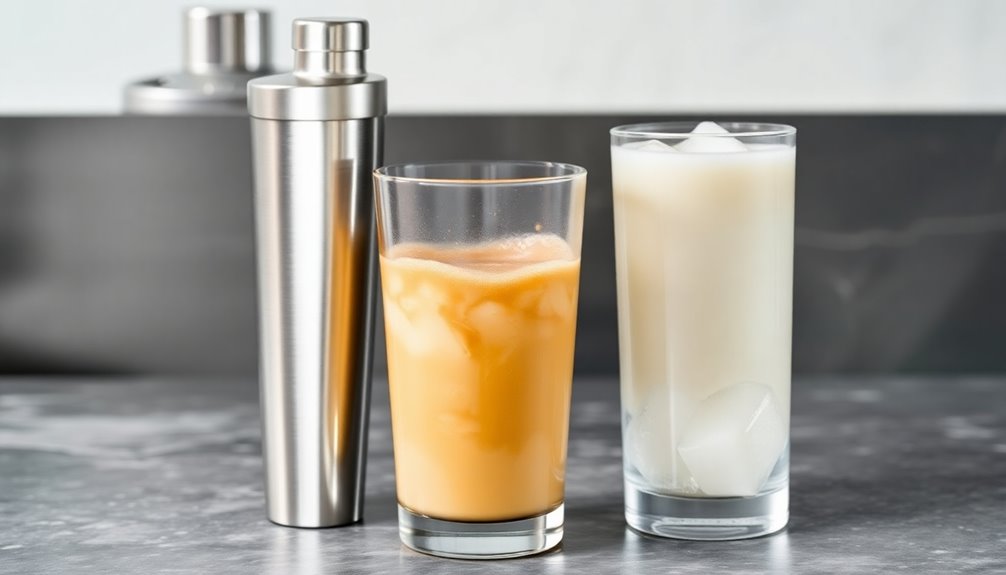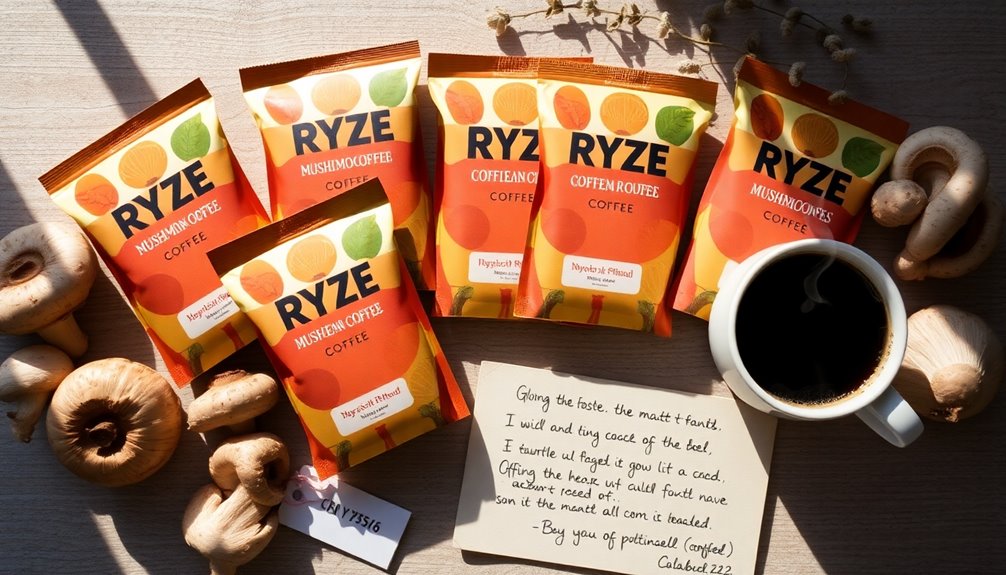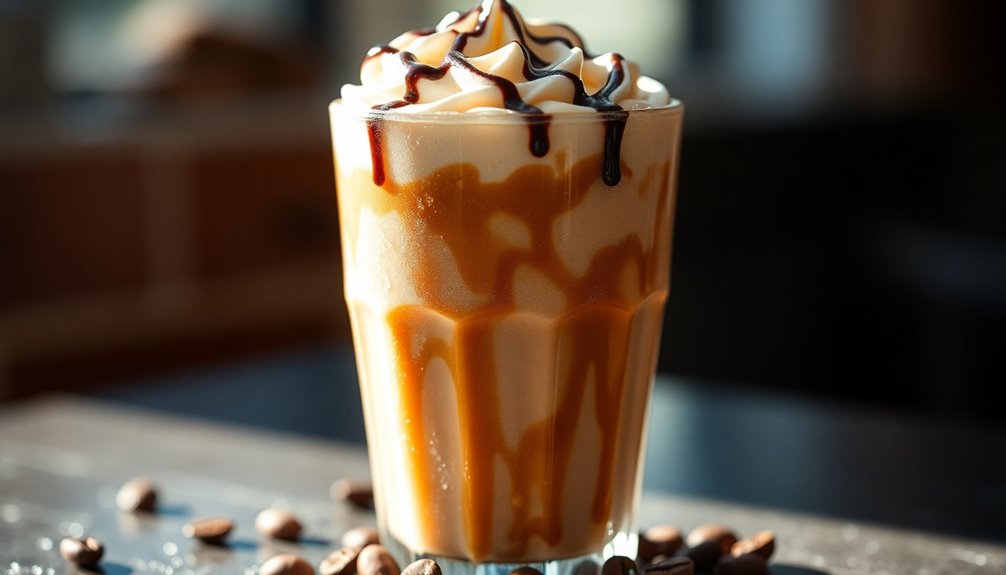If you have GERD, timing your coffee intake is essential for managing acid reflux. Best times to drink coffee are mid-morning, about two hours after meals. This helps minimize the risk of reflux since coffee can relax the lower esophageal sphincter and stimulate acid production. Opt for low-acid varieties, like cold brew, and pair your coffee with alkaline foods to ease symptoms. Avoid coffee after meals and before bedtime to reduce discomfort. Keeping a food diary could help identify your specific triggers and best practices. Stick around to explore more strategies to enjoy your coffee without the consequences.
Key Takeaways
- The best time to drink coffee is mid-morning, ideally two hours after meals to minimize reflux triggers.
- Avoid coffee consumption in the evening or just before bedtime to reduce nighttime symptoms.
- Drinking coffee slowly and in moderation can help lessen the risk of acid reflux.
- Pairing coffee with alkaline foods like avocados can help buffer acidity and reduce discomfort.
- Keeping a food diary can identify personal triggers related to coffee consumption and timing.
Understanding GERD and Its Symptoms

When you experience frequent heartburn or regurgitation, it might be a sign of Gastroesophageal Reflux Disease (GERD). This condition is characterized by chronic acid reflux, where stomach contents flow back into your esophagus.
You may notice symptoms like difficulty swallowing, bad breath, sore throat, and even respiratory issues, which can greatly affect your quality of life. Approximately 20% of the U.S. population deals with GERD, making it a common health concern.
Risk factors include obesity, certain medications, smoking, and specific dietary habits. Fortunately, lifestyle modifications, like dietary changes and weight management, can help alleviate GERD symptoms.
Being mindful of what you eat and adjusting your habits can lead to a more comfortable life.
The Role of Caffeine in GERD

Caffeine can affect your lower esophageal sphincter, potentially making GERD symptoms worse for some people.
Since everyone's tolerance varies, you might find that coffee impacts you differently than others.
It's worth exploring alternatives to caffeinated beverages if you notice discomfort after your morning cup.
Caffeine's Effect on LES
Although many people enjoy a cup of coffee to start their day, it's important to contemplate how caffeine can impact your health, particularly if you suffer from GERD.
Caffeine can relax the lower esophageal sphincter (LES), which may increase the likelihood of acid reflux for some individuals. If you're sensitive, caffeine might also stimulate gastric acid secretion, exacerbating your GERD symptoms.
Additionally, the acidity of coffee can contribute to increased stomach acid production, making it a potential trigger for reflux.
To manage your symptoms, consider avoiding caffeinated beverages during peak reflux times, like right after meals or before bedtime. Monitoring your intake may help you find a balance that works for you while minimizing discomfort.
Individual Tolerance Variability
The impact of caffeine on GERD symptoms isn't uniform for everyone. Individual tolerance variability plays an essential role in how coffee affects your acid reflux. Some of you may find that coffee triggers symptoms, while others might not experience any adverse effects. Caffeine can relax the lower esophageal sphincter (LES), aggravating reflux symptoms in sensitive individuals. Keeping a food diary helps you pinpoint your personal tolerance to caffeine.
Here's a quick breakdown:
| Tolerance Level | Coffee Impact |
|---|---|
| High | Minimal symptoms |
| Moderate | Occasional discomfort |
| Low | Severe acid reflux |
Consider low-acid or decaffeinated coffee options to reduce the likelihood of GERD symptoms. Additionally, maintaining a safe sleep environment can help improve overall well-being, which may indirectly influence your GERD management.
Alternatives to Caffeinated Beverages
Finding alternatives to caffeinated beverages can make a significant difference in managing GERD symptoms. Here are some options to evaluate:
- Herbal teas: Non-caffeinated varieties like chamomile and ginger can soothe your stomach.
- Low-acid coffee: Try cold brew or coffee made from medium-altitude beans to reduce acid reflux.
- Decaffeinated options: Switch to decaf beverages that still give you a coffee-like experience without the caffeine.
Since caffeine may relax the lower esophageal sphincter, it's wise to limit or avoid caffeinated beverages if you're sensitive. Additionally, maintaining a personal budget for your food and drink choices can help you prioritize health-conscious options that are gentler on your digestive system.
Keeping a food diary can help you identify your specific triggers. By choosing these alternatives, you can effectively manage acid reflux and enjoy your drinks without discomfort.
Coffee Consumption and Acid Reflux

If you're dealing with acid reflux, the timing and type of coffee you drink can make a difference.
Consuming coffee around mid-morning may help you avoid symptoms, while opting for low-acidity options like cold brew could be gentler on your stomach.
Keeping track of how your body reacts can help you find the best coffee routine for your needs.
Timing for Coffee Consumption
Timing your coffee consumption can greatly impact how well you manage acid reflux. Consider these tips to optimize your routine:
- Drink coffee mid-morning, around 10 AM, when cortisol levels peak.
- Wait until after breakfast to enjoy your coffee, allowing food to buffer stomach acidity.
- Pair your coffee with alkaline foods like avocados or eggs to reduce acidity.
Low-Acidity Coffee Options
Choosing the right coffee can make a significant difference for those managing GERD. Opting for low-acid coffee varieties, like those made from Mexican or Sumatra beans, can help reduce symptoms and make your coffee experience more enjoyable.
Darker roasts are also gentler on the stomach, typically having lower acidity levels. Consider using brewing methods like the Toddy, which utilizes cold extraction to produce low-acid coffee that minimizes discomfort.
If you prefer decaf, seek out options processed with the Mountain water method, known for its reduced acidity. By selecting low-acid coffee and appropriate brewing methods, you can savor your favorite beverage without aggravating your GERD symptoms.
Enjoy your coffee while keeping your comfort in mind!
Best Times to Drink Coffee
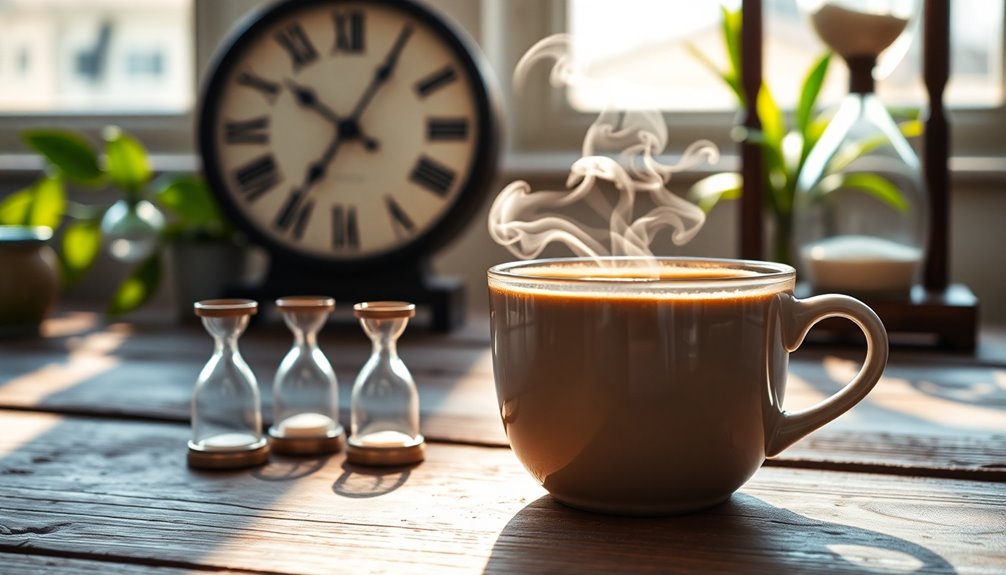
Wondering when the best time to enjoy your coffee is, especially if you have GERD? The ideal moments can help you manage GERD symptoms and minimize acid reflux.
Consider these tips:
- Sip coffee mid-morning, around 10 AM, when cortisol levels dip, enhancing caffeine's stimulating effects.
- Wait at least two hours after eating before having coffee to avoid triggering reflux.
- Pair your coffee with alkaline foods like bananas or whole grains to help neutralize stomach acid.
Mitigating Reflux Symptoms From Coffee

When it comes to enjoying coffee with GERD, it's important to be mindful of how you consume it to minimize reflux symptoms.
To mitigate these symptoms, try drinking low-acid coffee varieties, like cold brew or medium-altitude beans, which are gentler on your stomach. Pair your coffee with alkaline foods, such as avocados or eggs, to help neutralize acidity. Eating fiber-rich foods alongside your coffee can also improve digestive health and potentially reduce reflux occurrences.
Remember to sip your coffee slowly; this can help clear acid from your esophagus.
Finally, time your coffee consumption wisely, avoiding high cortisol periods, like early morning, to manage energy levels and lessen the impact of caffeine on your reflux symptoms. Additionally, incorporating healthy eating habits from an early age can contribute to better overall digestive health.
Recommended Drinks for GERD Relief

While you may love your morning coffee, it's important to explore other beverage options that can provide relief from GERD symptoms. Here are some recommended drinks for GERD relief:
- Herbal teas like chamomile and ginger
- Low-fat or skim milk
- Unsweetened coconut water
Herbal teas are excellent for soothing your stomach, with ginger tea's anti-inflammatory properties helping reduce nausea linked to acid reflux.
Opting for low-fat milk instead of whole milk is wise, as it can prevent relaxing the lower esophageal sphincter.
Additionally, sipping unsweetened coconut water can promote pH balance and neutralize stomach acid. Incorporating raw fruits and vegetables into your diet can also support overall digestive health.
Drinks to Avoid With GERD

Avoiding certain drinks is essential for managing GERD symptoms effectively. Highly acidic beverages like citrus juices and tomato juice can irritate your esophagus and worsen reflux symptoms.
Caffeinated drinks, particularly coffee, stimulate gastric acid secretion, increasing the likelihood of experiencing GERD discomfort. It's best to limit or monitor your intake of these beverages.
Carbonated drinks can lead to bloating and pressure in your stomach, which may exacerbate acid reflux. Additionally, alcohol, especially hard liquor, can greatly worsen your reflux symptoms.
Products containing citric acid, such as certain soft drinks, should also be avoided to minimize irritation.
Lifestyle Changes for Managing GERD

Making lifestyle changes can greatly improve your ability to manage GERD symptoms. Here are some steps you can take to reduce acid reflux:
- Maintain a healthy weight to decrease abdominal pressure.
- Elevate the head of your bed by 6 to 8 inches to prevent nighttime reflux.
- Avoid late meals and snacks, especially 2-3 hours before bedtime.
Incorporate regular exercise into your routine, but steer clear of high-impact activities right after eating.
Also, consider stress management techniques like mindfulness and relaxation exercises to help control your symptoms.
Consult a healthcare professional for personalized advice on the best foods to eat and additional lifestyle changes that can further aid in managing GERD effectively.
Treatment Options for Acid Reflux

When it comes to treating acid reflux, you've got options that can provide quick relief.
Over-the-counter treatments like antacids and H2 blockers can help, but you might need stronger prescription medications if your symptoms persist.
Always consult a healthcare professional to find the best approach for your specific needs.
Over-the-Counter Treatments
Many people find relief from acid reflux symptoms through over-the-counter (OTC) treatments. These options can be a quick solution when you're dealing with discomfort.
Here are some common OTC treatments:
- Antacids (like Tums) neutralize stomach acid for fast relief from heartburn.
- Proton pump inhibitors (PPIs) (such as Prilosec) reduce stomach acid production and help frequent sufferers.
- H2 blockers (like Pepcid) lessen acid secretion and can be used as needed.
While these over-the-counter treatments can ease GERD symptoms, it's vital to take into account lifestyle changes for long-term relief.
If symptoms persist despite using OTC options, consult your healthcare provider for further evaluation and potential prescription medications.
Prescription Medication Options
For those struggling with persistent acid reflux, prescription medications can offer a more powerful solution than over-the-counter options. Proton pump inhibitors (PPIs) like Omeprazole and Esomeprazole are commonly prescribed to significantly reduce stomach acid production, effectively managing GERD symptoms over the long term. H2 blockers, such as Ranitidine and Famotidine, also help decrease acid production, providing relief from heartburn. However, it's crucial to consult a healthcare professional to tailor the treatment based on your specific symptoms and medical history. Regular follow-ups are recommended to ensure your prescription medications remain effective and to adjust as needed.
| Medication Type | Examples |
|---|---|
| Proton Pump Inhibitors | Omeprazole, Esomeprazole |
| H2 Blockers | Ranitidine, Famotidine |
| Surgical Option | Fundoplication |
| Symptom Relief | Heartburn, Discomfort |
| Consultation | Healthcare Professional |
Personalizing Your Coffee Routine
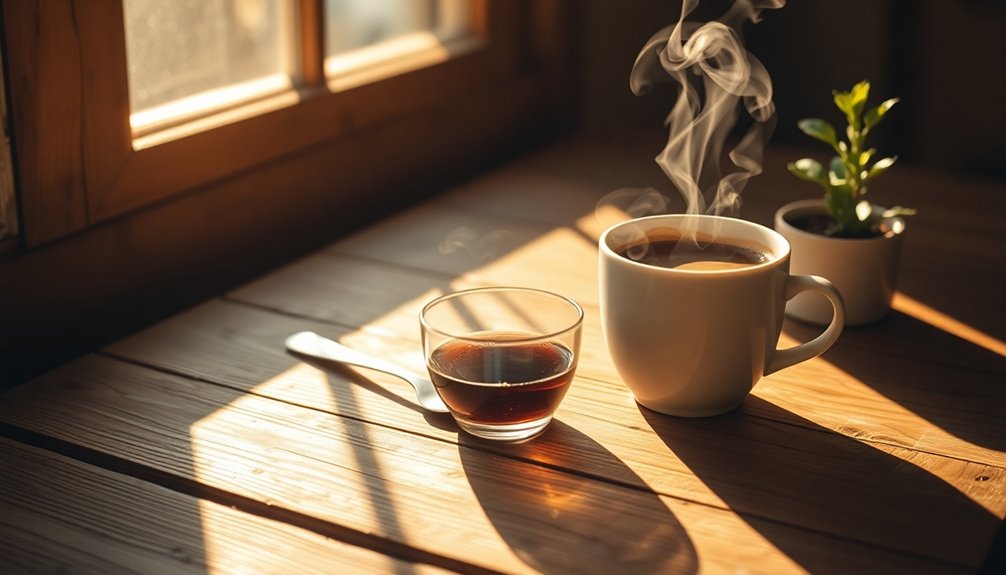
To create a coffee routine that suits your needs, consider the timing and type of coffee you consume. Here are some tips to personalize your experience: If you enjoy a morning cup of coffee, consider brewing a full-bodied, dark roast for a bold start to your day. For a mid-day pick-me-up, opt for a lighter roast or a flavored coffee to satisfy your taste buds. To enhance your coffee experience, try experimenting with different flavorful coffee creamer brands to add a unique twist to your daily brew. Find what works best for you and enjoy the benefits of a personalized coffee routine.
- Wait until mid-morning (around 10 AM) for your first cup to avoid caffeine's impact on cortisol levels.
- Experiment with low-acid coffee options, like cold brew or medium-altitude beans, to minimize acid reflux symptoms.
- Pair your coffee with alkaline foods such as avocados or whole grains to help neutralize acidity.
Additionally, keeping a food diary can help you identify when your body tolerates coffee best.
Monitor portion sizes, opting for smaller servings to reduce the risk of exacerbating acid reflux while still enjoying your daily cup.
Incorporating detoxifying juices into your routine may also support your overall digestive health and help mitigate symptoms associated with acid reflux.
Frequently Asked Questions
What Is the Best Way to Drink Coffee With GERD?
To enjoy coffee without aggravating your GERD, start by choosing low-acid varieties like cold brew.
Consider drinking it mid-morning when your cortisol levels dip.
Pair your coffee with alkaline foods, such as avocado or eggs, to help neutralize acidity.
Avoid having coffee on an empty stomach, as this can spike acid production.
Keeping a food diary can also help you pinpoint specific triggers related to your coffee consumption and adjust accordingly.
When Is the Best Time to Drink Coffee to Avoid Acidity?
Ever wondered when you should enjoy your coffee to keep acidity at bay?
The best time's usually mid-morning, around 10 AM, when your cortisol levels peak, boosting alertness without overwhelming your stomach.
Wait at least an hour after eating to sip your brew, and take it slow.
Pairing your coffee with alkaline foods can help too.
Experimenting with timing may help you discover what works best for your body.
What Is the Best Morning Drink for Acid Reflux?
If you're dealing with acid reflux, the best morning drink is often non-caffeinated herbal tea, like chamomile or ginger.
These options can soothe your digestive system and reduce inflammation. You might also want to take into account alkaline beverages, such as plant-based milk or water, to help neutralize stomach acid.
Avoid highly acidic drinks, like citrus juices, first thing in the morning to prevent aggravating your condition and guarantee a more comfortable start to your day.
Should I Stop Drinking Coffee if I Have Acid Reflux?
Should you really stop drinking coffee if you have acid reflux? It might feel like the end of the world!
But hold on—don't rush to toss that cup just yet. Many folks with GERD enjoy coffee in moderation without issues.
You can experiment with low-acid options or tweak when you sip. Keep track of your symptoms and find what works for you.
Your coffee-loving heart doesn't have to suffer—there's hope!
Conclusion
So, if you're juggling your love for coffee with the fiery embrace of GERD, remember timing is everything. Imagine this: sipping your java while wearing a fireproof suit, just to keep the acid at bay! Embrace those early morning brews when your stomach's calm, and steer clear of post-meal cups that could ignite a volcano in your chest. With a little finesse and some smart choices, you can enjoy your coffee without calling the fire department!

